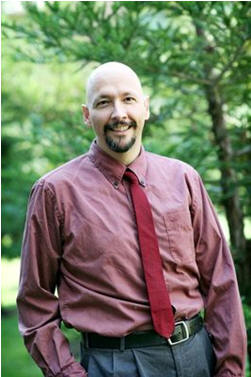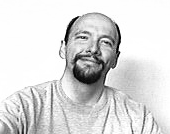William G. Vicars:
An introduction to
William G. Vicars, Ed.D.
Hello ASL Heroes!
Great to meet you!
I'm Bill Vicars.
My students tend to call me "Dr. Bill" or "Dr. V."
My folks tend to call me Billy.
What my wife calls me depends on a number of factors.
I'm president and owner of the Lifeprint Institute, a consultation business focusing on technology-enhanced delivery of ASL Instruction, excursion-based instruction (trips to amusement parks), and extended-immersion-based program coordination (intense two-week residencies).
I also have a "day job." I am full-time tenured Associate Professor of American Sign Language and Deaf Studies at California State University, Sacramento.
I am "Deaf/hh." What that means is I am physically hard-of-hearing and have chosen to live in the Deaf World (e.g. marry a Deaf woman, use ASL, work in the field of Deaf-Studies, worship at a Deaf church, devote my time to developing ASL-related resources for others, etc.).
I learned ASL in my youth from a Deaf woman (Kathy Hadfield-Erwin) who lived in the same small town (Brigham City, Utah) where I grew up.
Forgive this next bit of information (I share it because some people want to know their instructor's qualifications).
Some of my degrees and certifications (past and/or present) include:
Ed.D. (Education Doctorate) in Deaf Studies/Deaf Education from Lamar University (accredited), Masters in Deaf Education (accredited), MCSE (Microsoft Certified Systems Engineer), MCT (Microsoft Certified Trainer), A+ (COMPTia Computer Technician), N+ (Network Technician), ASLTA certification (American Sign Language Teachers Association), and "EdNet" (Distance Education Certificate). Most of which have probably expired (except the degrees, last I checked they don't have an expiration date).
At one point I studied for and passed the Utah Real Estate License exam, but as it turns out I didn't want to spend my life trying to lipread clients from the side while driving them around to look at houses (plus my hearing aid is almost worthless in a car due to road noise.) Oh well -- at least it spurred me on to go back to school and get my doctorate.
Some of my current and/or past experiences and qualifications include:
- Over 20 years experience as a university-level ASL instructor
- Authored and self-published "Sign Me Up!" (A really cool 212-page ASL Guide and activity book. Sorry, sold out all 3,000 copies--but I turned it into the Lifeprint website.)
- Directed an 18-month Interpreter Training Workshop (twice!)
- Co-chaired the Disability Law Center's Consumer Advisory Council (UT)
- Served a term as an elected board member of the Utah Association for the Deaf
- Parent of a child who attended the Utah State School for the Deaf pre-school program
- Set up and directed a not-for-profit a 501(c)(3) organization to improve Deaf access to services
- Served as Advisor to the Sign Language Association (ASL Club) at Weber State University (an award winning organization).
- As far as I know, I was the first ASL instructor from Utah to earn certification from the American Sign Language Teachers Association. A bit of nostalgia for you -- way back when I first joined ASLTA they called themselves S.I.G.N. (Sign Instructors Guidance Network). Hooyah!
Yadda, yadda, yadda... and a bunch of other stuff.
For the past few years I've been focusing on my duties as Coordinator of the ASL and Deaf Studies Program at California State University, Sacramento where I teach a variety of Deaf Studies courses and topics, (ASL linguistics, Classifiers, Medical Signing, etc.). Don't let the "coordinator" title impress you. It is just code for "work harder with no extra pay." My colleagues and I take turns being coordinator every three years and I was glad to do my part. (My "part" is/was from Fall '09 to Spring of 2012).
For over 20 years now I've enjoyed being married to a wonderful person named Belinda (Williams) Vicars. We have four terrific orangutans, er, kids.
My wife also teaches ASL.
(She is actually a better ASL teacher than I am -- but at least I tell better jokes. Or maybe she is just being polite when she laughs? Hmmm. Gotta think on that.)
She was born deaf as a result of the rubella epidemic of 1964. (Whoopsie, gave away her age. Shhhh, act surprised when you find out.) She attended a day-program for the Deaf in Bakersfield, California. She learned ASL prior to learning how to talk. She has taught college ASL classes and numerous community education ASL courses for many years. She's a wonderful mom, and is rumored to be a great cook. Once in a while I let her beat me in Scrabble. (It is good for her self-esteem.)
People ask us if our children are Deaf.
I tell them my kids are "hard of listening" (heh). [That isn't a technical term folks.]
The older three kids have normal hearing (when they want to).
They understand ASL quite well and tend to sign when they want something.
The youngest, Sarah, is Deaf/hh. She also has Apert's syndrome. But she is a bundle of joy and energy. (She's a brave, spunky kid I'll tell you.) She attended the Utah State School for the Deaf pre-school day-program. Then she attended a "special ed" program at a local charter school. Currently she attends high school here in Sacramento.
We share a home in Sacramento, California with several small furry creatures, (that's pets. The pets are furry, not the kids).
- Dr. Bill
Frequently Asked Questions:
Question: Are you Deaf?
Answer:
I was born hard-of-hearing and as time goes on I become more and more physically Deaf.
For the majority of my life I have lived in the Deaf World (e.g. Deaf wife, hang out with Deaf friends, use ASL, work in the Deaf-Studies field, worship at a Deaf church, devote my time to developing ASL-related resources for others, etc.) I use close-captioning (subtitles) when I watch videos. I can pretty much understand what people are saying if it is one-on-one in a quiet environment, I've got my hearing-aid in, and I can see their face. But if it is a group setting, or if the person is more than a few feet away, has a mustache, an accent, or a bright light behind them I prefer to have an interpreter.
Question: Where did you learn ASL?
I started learning ASL as a youth from a Deaf woman, (Kathy Hadfield of Brigham City, Utah. She later married Mark Erwin -- so she is now Kathy Erwin.) Then when I grew older I learned more as I lived with Deaf roommates, and hung out with other Deaf people. Here are a few of the experiences that influenced me:
* Worked as a volunteer at the the Indiana School for the Deaf (as a teacher's assistant in Laura Gaalema's third grade class)
* Worked as a volunteer for GLAD Orange County Outreach in California
* Worked as a volunteer the (former) Indiana Branch Office (anybody remember that one?) of the National Association of the Deaf
* Lived on-campus at Gallaudet University during a summer internship program.
* Took night classes at the Oregon School for the Deaf (Salem).
* Participated in a couple hundred hours worth of "American Judicial System" - related ASL training at a summer program at California State University Northridge
* Attended many, many workshops
* Researched ASL Linguistics, ASL acquisition, and Computer Assisted Language Learning during my doctoral studies Lamar University
* Directed/participated in 15 years of "immersion excursions" to exciting places with Deaf co-hosts
* Directing an interpreter-training program for Davis County school district during which I interviewed, hired, and worked closely with many (over 30) Deaf guest-speakers and/or trainers
* And lately I spend much of my time discussing the nuances of ASL with my d/Deaf colleagues at work.
Question: Are you a member of the "Deaf Community?"
Answer: Almost all of my close friends and associates are tied to the Deaf Community. For most of my life I've lived in the Deaf World. Serving in Deaf organizations, setting up Deaf events, working with Deaf people, teaching ASL, etc.) Belinda and I never expected any of our children to be Deaf, but Sarah (our fourth) was born with a substantial hearing loss due to having Aperts (a rare syndrome). Sarah attended the Utah State School for the Deaf pre-school program.
Question: Are you certified?
I hold a doctorate in Deaf Education / Deaf Studies from an accredited university (Lamar University in Beaumont, Texas). I hold a masters in Deaf Education from Lamar university. I am (or was -- depending on if I have renewed or not) certified by the American Sign Language Teachers Association. I was a member of ASLTA back when they were still S.I.G.N. (Sign Instructors Guidance Network). As far as I have been able to ascertain, I was the first person from Utah to become ASLTA certified. (I'm now in California.) When I was much younger I actually used to be a certified interpreter (I used to put on both hearing aids and crank them up. It doesn't work anymore though--too Deaf now).
Question: What kind of experience do you have teaching ASL?
Teaching ASL is my life's work. I taught ASL at Weber State University in Ogden, Utah for over a decade. I have also taught ASL classes and/or workshops at the Utah Community Center for the Deaf, the IRS, Hill Air Force Base, Defense Depot Ogden Utah, Mills Montessori School, the Newgate Mall, Your Community Connection of Ogden, Clearfield Community Schools, Davis County School District, Weber County School District, Ogden City Corporation, The Sign Language Studio, Lifeprint Institute, Lamar University in Beaumont Texas, The Sign Language Association, California State University--Sacramento, and dozens of other places. (Geeze, I must be getting old to have that many experiences.) [Editor's note: Since I wrote the above, I've added "Guyana, South America" to the list. By far the hardest work -- and the most fun.]
Question: I read somewhere that you got a degree from ___________ University. I'm thinking about going with them. Do you think that program is worth while? t is certainly more affordable then other programs. Are they fairly well accepted in the professional field?
ANSWER: No. Don't go with ___________. It seemed like such a good idea at the time to go with ___________ since they were (and I believe still are) approved by the California State Board of Education. Of the various degrees out there I (at first) thought they were a good choice.
It was a mistake. I ended up repenting of that mistake by going BACK to a DIFFERENT school at an accredited university for three additional years to get an accredited doctoral degree.I went back to school because it became evident to me that to have "rock solid" credibility I'd have to have a degree from an accredited college. It is that simple.
So, the second time around I chose Lamar University (in Beaumont, Texas) because of their excellent program and consistent support for best practices in Deaf Education. They are innovative and were willing to let me develop new ideas and technology. Going back to school meant selling my house (at a $30,000 loss) and moving my family of six half-way across the country -- but it was worth it. I'm glad I did it.
Note: These days there are a number of accredited doctoral programs out there now with minimal residency requirements that are certainly worth checking into. Belinda completed an accredited degree in Creative Writing from a distance education program offered by Union Institute (an affiliate of Vermont College). Then she went on to earn an accredited Master of Fine Arts Degree in Creative Writing through a program in Oregon that combined distance education with summer residencies. It worked out very well for her.
You can learn American Sign Language (ASL) online at American Sign Language University ™
ASL resources by Lifeprint.com © Dr. William Vicars

